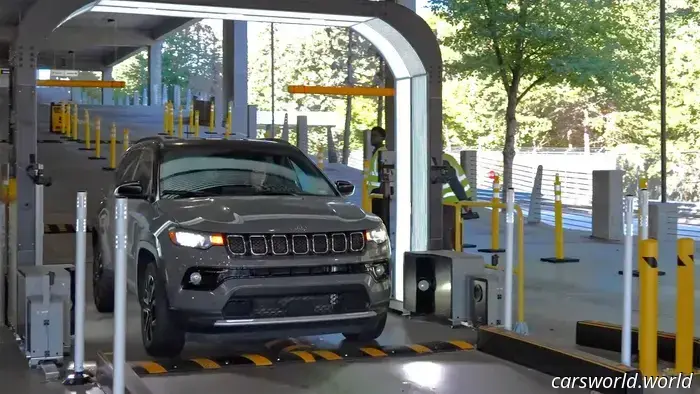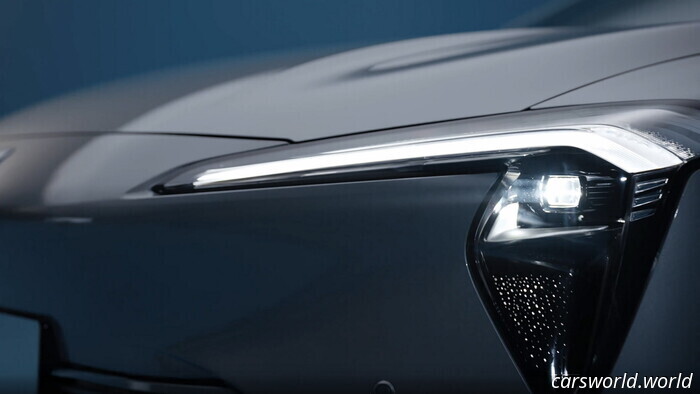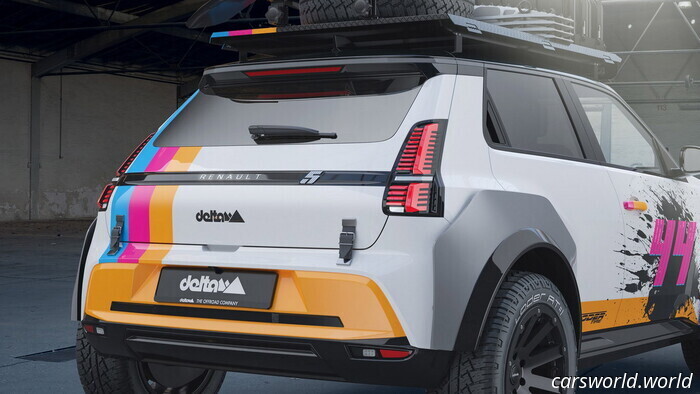
Hertz AI Scanner Imposes $350 Fees for Minor 'Dings' on Rentals, and This Is Getting Out of Hand
A few weeks back, we reported on a Hertz customer in Atlanta who rented a vehicle from a location equipped with an AI-driven scanner for inspections. Their experience of being billed $440 for a minor scratch on a wheel caught some attention, and similar incidents are beginning to surface. One particular case from another customer stands out as even more concerning.
Adam Foley took to LinkedIn to share his experience, stating that just a few hours after he returned his vehicle, he received a notification indicating that the system had detected two areas of damage, each of comparable size. One was located on the car’s roof, while the other was on the front fender on the driver’s side. Foley shared a picture of the fender damage in a comment on his post, which appears to be minimal—smaller than a dime and not very deep. He informed the Daily Mail that Hertz billed him a total of $350—$80 for each dent and an additional $190 in processing and administrative fees.
If you read our previous article concerning the wheel scuff, you may be aware that UVeye—the company that creates and operates the scanners—along with Hertz, seeks to collect these fees as swiftly as possible. They offer a discounted fee if the customer accepts responsibility and pays within seven days. Foley mentioned that Hertz proposed a $65 discount if he paid immediately. Moreover, we have heard that it is quite challenging to reach a human representative at the company to discuss or dispute the charges; this is not possible through the web portal where customers can view and settle damage fees. Instead, one must call a separate support line, although Hertz doesn't seem to clarify that very well.
“To contest this fee, it’s an automated AI chat process that does not provide an option to speak to a human, regardless of the choices made,” Foley remarked on LinkedIn. “You are only given reasons for why you still owe $190.”
Foley has stated that he will not rent from Hertz again as long as this policy remains in effect. Ironically, the public might be more accepting of AI-checked rentals if Hertz approached the situation more reasonably. In my previous article, numerous readers commented that the swift assessment of damage, along with visual evidence and the straightforward payment process, seemed fair to them and reduced some of the confusion typically encountered during a rental return, which can lead to lengthy disputes.
Hertz is aware of this as well. When we reached out following our last article, a company representative stated, “the vast majority of rentals are incident-free. When damage does occur, our goal is to enhance the rental experience by providing improved transparency, precision, and speed in the process.”
While transparency and speed are advantageous, the main concern here revolves around the types of imperfections the machine identifies, which Hertz subsequently charges hefty fees for. A minor dent like the one on Foley’s fender might easily be overlooked by a human inspector, and it likely wouldn’t register with a customer. It wouldn’t bother the next renter getting into that car for the first time, and it’s certainly not the kind of damage that would prompt the average car owner to urgently hire a paintless dent removal technician.
These minor, inconsequential wear-and-tear incidents typically occur when a vehicle is utilized by numerous drivers and passengers over a month. That ding could have resulted from gravel on the highway or someone unintentionally hitting the rental car with their door in a parking lot. The real question is why Hertz is charging for it, and the answer may be quite straightforward: Because they can.
“I want to be clear that I find this use of AI rather intriguing—using cameras and AI to evaluate damages and communicate payment expectations,” Foley expressed. “It appears reasonable.” However, he stated, “What doesn’t make sense is the level of detail they have reduced their inspections to, focusing on trivial ‘damages’ and establishing a system without human interaction. A process aimed at identifying legitimate damages, like a broken mirror, would likely lead customers to acknowledge their responsibility and pay up. I suspect that the cost of investing in such advanced technology required them to adopt these exploitative measures to ensure a return on investment.”
We are unsure of the expense that UVeye’s technology imposes on Hertz. When I last inquired, I asked whether the locations implementing the AI scanners (which are exclusively at airports) are more expensive than other Hertz locations. They didn’t respond to that query, but I now understand that AI-scanned rentals wouldn’t necessarily need to be pricier—they simply need to identify an issue and levy a charge, regardless of whether Hertz puts in the effort to repair the “damage.” Clearly, detecting something minor is not particularly challenging for these high-powered scanners.
Have any tips? Send them to [email protected]

Other articles
 Buick's New Sub-Brand Hints at Its Initial Sedan, But It's Not Meant for Everyone | Carscoops
The unnamed model belongs to Buick's Electra sub-brand and will be built on the new Xiao Yao platform designed specifically for China.
Buick's New Sub-Brand Hints at Its Initial Sedan, But It's Not Meant for Everyone | Carscoops
The unnamed model belongs to Buick's Electra sub-brand and will be built on the new Xiao Yao platform designed specifically for China.
 Here’s How to Activate Rivian’s Kick Turn on the First Generation R1T and R1S Quad.
Achieving Kick Turn on a first-generation quad-motor Rivian comes with a significant price tag.
Here’s How to Activate Rivian’s Kick Turn on the First Generation R1T and R1S Quad.
Achieving Kick Turn on a first-generation quad-motor Rivian comes with a significant price tag.
 Ford Replaces Employee Pricing with an Offer That Could Potentially Save You More | Carscoops
Customers will have the opportunity to purchase a new Ford and enjoy a 90-day payment deferment.
Ford Replaces Employee Pricing with an Offer That Could Potentially Save You More | Carscoops
Customers will have the opportunity to purchase a new Ford and enjoy a 90-day payment deferment.
 This Renault 5 EV That Charges Into Controversy Should Be Realized | Carscoops
Delta 4x4, which has primarily showcased the modified EV as a digital concept, may provide a conversion kit if there is sufficient demand from customers.
This Renault 5 EV That Charges Into Controversy Should Be Realized | Carscoops
Delta 4x4, which has primarily showcased the modified EV as a digital concept, may provide a conversion kit if there is sufficient demand from customers.
 From over $200K to $128K: The Demon 170 saw a rapid decline | Carscoops
A Dodge Demon 170 with ultra-low mileage recently sold for significantly less than anticipated, highlighting the rapid changes in the market.
From over $200K to $128K: The Demon 170 saw a rapid decline | Carscoops
A Dodge Demon 170 with ultra-low mileage recently sold for significantly less than anticipated, highlighting the rapid changes in the market.
 YouTubers Taken Into Custody Following Allegations of Causing More Than $40K in Damages to F1 Vehicle | Carscoops
According to reports, one of the streamers attempted to sit in a Formula 1 car that was being showcased.
YouTubers Taken Into Custody Following Allegations of Causing More Than $40K in Damages to F1 Vehicle | Carscoops
According to reports, one of the streamers attempted to sit in a Formula 1 car that was being showcased.
Hertz AI Scanner Imposes $350 Fees for Minor 'Dings' on Rentals, and This Is Getting Out of Hand
An increasing number of Hertz customers are discovering that renting from a location equipped with an AI scanner often leads to charges for even the smallest items.
